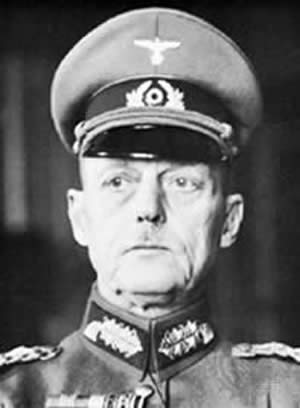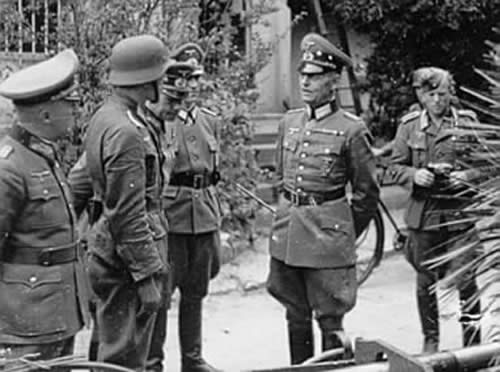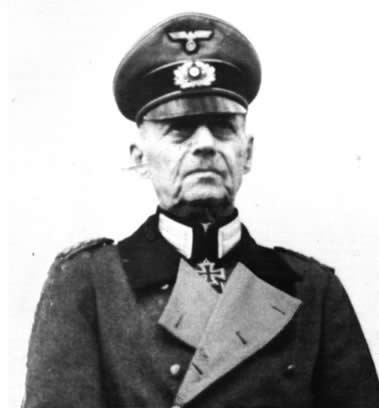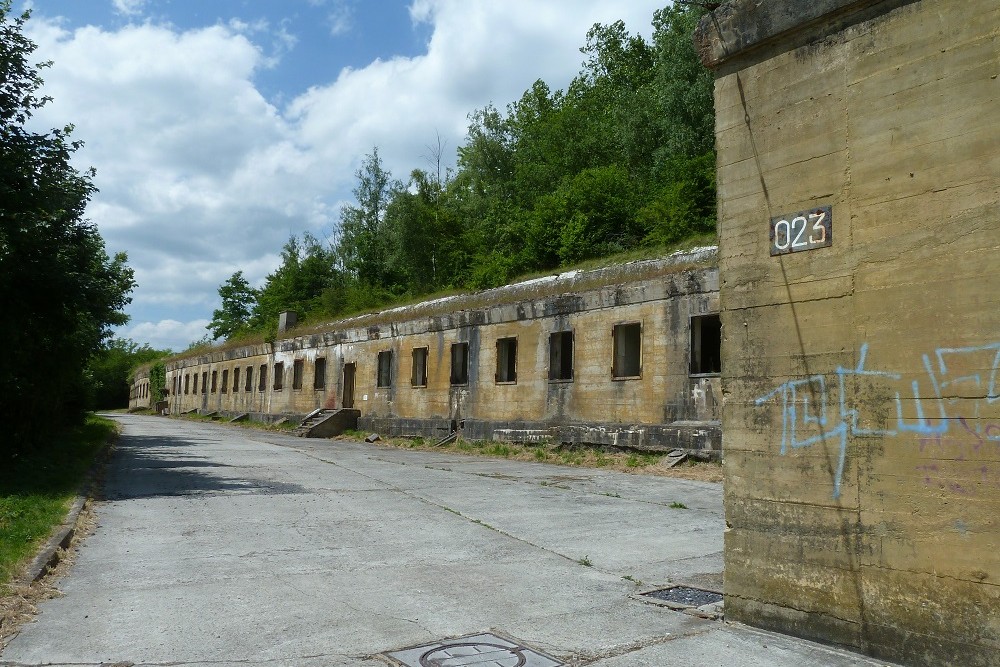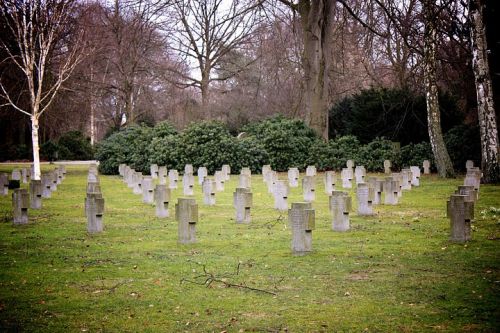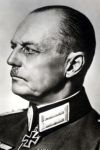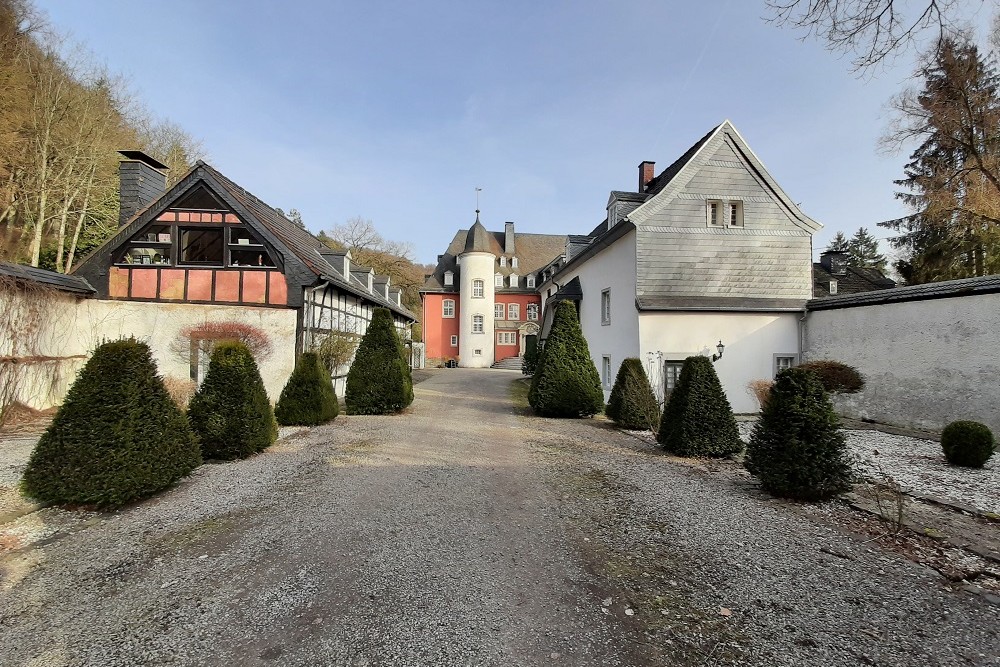Gerd von Rundstedt
Karl Rudolph Gerd von Rundstedt was born December 12th 1875 in Aschesleben in the Harz mountains near Magdeburg. He came from a military family dating back to the 12th century. When Gerd was born, his father served in a Prussian regiment of Hussars in the rank of Lieutenant. His mother was the daughter of a real estate owner.
At the age of 12, he went to cadet school in Oranienstein. He already spoke English as his mother had employed an English nanny to take care of her children. Later, Von Rundstedt would even take the exam for French interpreter. At the age of 16, he was admitted to the Haupt Kadettenanstalt (central Prussian school for Cadets) in Gross Lichterfelde near Berlin, successfully graduating in 1892 to be admitted to the rank of candidate officer.
In 1892, Von Rundstedt joined the 83. Infanterieregiment Von Wittlicht (Kurrhessische No. 3) in Kassel for a period of six months before taking his exam for the rank of Fähnrich at the Kriegsschule in Hannover. In 1902, he married Louise von Götz, the daughter of a retired officer. In that same year, he passed the entrance examination to the Kriegsakademie whereupon the young couple moved to Berlin.
In 1906 Von Rundstedt was posted to the Generalstab on probation and after having passed the final, very difficult exam, he was promoted to Hauptmann on the Generalstab in March 1909. He was posted to the staff of headquarters of the IX. Armeekorps and in 1912 he went to work as company commander in the 171. Infanterieregiment in Colmar in Alsace-Lorraine.
At the outbreak of the First World War, 39-year-old Von Rundstedt was immediately given a posting on the operational staff of the 22. Reserve division. He owed his promotion to Major in November 1914 to the outbreak of the war by the way. During the battle on the River Marne, the 22. Reserve division was deployed on the right flank of the front. The division commander was killed in action whereupon Von Rundstedt was given command of the unit. At the beginning of the trench warfare, Von Rundstedt left the division and was posted to the staff of the German military government in Belgium. Afterwards he served in a division in Poland, in the military government in Warsaw, in an army corps in the Carpathians, an army corps on the Baltic coast and finally in 1918 as Chief of Staff of XV. Armeekorps on the western front. After the war, Von Rundstedt was posted to the new, starkly reduced German army, the Reichswehr.
After he had been promoted to Oberst in 1923, he was transferred from the 3. Kavalleriedivision to headquarters of Wehrkreis II as Chief of Staff. Two years on, he received a new command, this time of 18. Infanterieregiment (in 1938 he was named honorary member and he has always worn the uniform of the unit afterwards). In 1926, he returned to a staff position, this time as Chief of Staff of Obergruppenkommando II in Kassel. After his promotion to Generalmajor he was given command of the 2. Kavalleriedivision in Breslau. In 1929, he was promoted to Generalleutnant and in January of that year he became overall commander of Wehrkreis III in Berlin. In October that year he was appointed General der Infanterie and commander of Obergruppenkommando I, likewise in Berlin.
When Adolf Hitler came to power, Von Rundstedt was involved in the secret German rearmament. In March 1938, Hitler grabbed his chance to tighten his grip on the Wehrmacht. The two most prominent military men of Germany, Werner von Blomberg and Günther von Fritsch were ousted and also all those who sympathized with them. Von Rundstedt was not among them. He angrily submitted his resignation but his request was rejected. Hitler (Bio Hitler) probably did not want to lose his highest ranking general after seven of them on the list right beneath Von Rundstedt had been fired, including Wilhelm Ritter von Leeb (B) and Ewald von Kleist. Von Rundstedt was duly promoted to Generaloberst.
In October 1938, Generaloberst Von Rundstedt, commander of an Army Group, was involved in the invasion of the Sudetenland. When he became convinced that Hitler was preparing for war, he strongly argued that Germany was from being adequately equipped for war in the near future. As a result Hitler ordered Von Rundstedt to step down. Owing to a shortage of experienced commanders, Von Rundstedt was recalled. When the war started in September 1939, Von Rundstedt, in command of Heeresgruppe Süd (Army group south) participated in the attack on the main body of the Polish armed forces (Case White). He managed to prevent the Poles from retreating beyond the River Weichsel. For his achievements, Von Rundstedt was awarded the Ritterkreuz (Knight’s Cross).
Von Rundstedt was commander of Heeresgruppe A during the German attack on France and the Low Countries in May 1940 (Case Yellow). Along with the bulk of the armored forces, he advanced through the Ardennes, crossing the River Meuse and striking towards the Channel coast. A large part of the Allied armies was encircled near Dunkirk in the process. Total victory failed to materialize however as the armies were evacuated from Dunkirk. Von Rundstedt proposed, and Hitler ordered the Germans should not attempt to capture Dunkirk and so they missed the opportunity to deal with the British Expeditionary Force once and for all.
After the fall of France, Von Rundstedt was appointed feldmarschall by Hitler on July 19th , 1940. Preparations for Operation Seelöwe (Sea Lion), the invasion of Great Britain, got under way. This invasion never took place though because the Luftwaffe failed to win air superiority over the British Isles in the Battle of Britain. Hereafter, Hitler decided to leave Great Britain alone and commenced planning for a campaign against the Soviet Union. Heeresgruppe A was transferred to the General Government (that part of Poland occupied by the Germans) in order to prepare for the imminent attack on the Soviet Union.
In April 1941, Generalfeldmarschall Von Rundstedt was named commander of Heeresgruppe Süd; in fact, Heeresgruppe A was renamed Heeresgruppe Süd. When Operation Barbarossa was launched on June 22nd, 1941, Von Rundstedt’s Heeresgruppe initially struck deep into enemy territory. The advance stagnated though and he needed help from 2. Panzergruppe commanded by Generaloberst Heinz Guderian (Bio Guderian) in order to encircle his most important strategic target Kiev. (Battle of Kiev) After the encircled Soviets had surrendered, Heeresgruppe Süd struck towards Rostov on the River Don. Against Soviet counter-attacks, under command of Marshal S.K. Timoshenko (Bio Timoshenko), Von Rundstedt was forced to pull back dozens of miles. Hitler was furious so Von Rundstedt offered his resignation. Hitler accepted his request and replaced Von Rundstedt by Generalfeldmarschall Walter von Reichenau (Bio Von Reichenau) who only did what Von Rundstedt had ordered previously and was fired for: retreat to a defensive line on the River Mius.
In March 1942, Von Rundstedt was called back into service once more and appointed Oberbefehlshaber West (supreme commander), succeeding Generalfeldmarschall Erwin von Witzleben. He was to prepare the western front for the expected Allied invasion. In that capacity he supervised the construction of the Atlantikwall, an immense network of bunkers and fortifications stretching all the way from Spain to Norway. Later on he was assisted by Generalfeldmarschall Erwin Rommel (Bio Rommel). In 1942, the first invasion took place at Dieppe. The Germans however managed to defeat the predominantly Canadian invasion force in this downright suicide operation. In violation of the rules of land warfare, Von Rundstedt handed the Allied prisoners-of-war over to the Gestapo.
On D-Day, June 6th, 1944, the Allies landed in Normandy. Von Rundstedt had no free hand to act concerning the redeployment of troops. Hitler was of the opinion that the D-Day landings were no more than a diversionary maneuver for an even more massive landing in the Pas de Calais. Partly due to these irregularities - within the O.K.W. for instance he had no say over the armored reserves, making it extremely difficult to launch a coordinated counter attack in time - the Germans failed to push the Allies back into the sea. The result was that Hitler ordered Von Rundstedt on July 1st , 1944 to retire once more. Nonetheless, he was awarded the Eichenlaub (Oak Leaves) to his Knight’s Cross (Ritterkreuz).
The day after the failed assassination attempt on Hitler in the Wolfsschanze on July 20th, Von Rundstedt was appointed chairman of a Court of Honor (Ehrengericht). During this trial, officers of the Wehrmacht who were suspected of complicity in the murder attempt were discharged.
On September 1st , Gerd von Rundstedt was recalled by Hitler to become Oberbefehlshaber West (supreme commander). Formally, Von Rundstedt was responsible for the failure of the Allied Operation Market Garden. In October he let Hitler know, through Generalfeldmarschall Wilhelm Keitel, it would be better to end the war. Hitler fired him on the spot but quickly revoked his decision. After having been appointed ObW again, Von Rundstedt assisted in the planning for the offensive in the Ardennes as he was formally in command. The real tactical work during the operation itself was done by Generalfeldmarschall Walter Model (Bio Model), just like during the defensive battles of Market Garden. On February 18th, 1945, Hitler awarded him the Schwerter (Swords) to his Ritterkreuz for his distinguished services.
On March 11th , 1945, Von Rundstedt was stripped of his function for the last time, due to the successful crossing of the undamaged railway bridge across the Rhine at Remagen by American troops. Moreover, there were arguments with the O.K.W. about the tactic to be applied. After his discharge, Von Rundstedt sat watching idly until the end of the war.
In May 1945, near Bad Tölz, the field marshal was taken prisoner by the Americans and handed over to Great Britain. He spent more than three years in prison and appeared before the military tribunal in Nuremberg as a witness, making an impression by his dignified attitude. Although he had been involved in most military campaigns on the highest level, the British never seemed to have considered bringing any charge against him.
Gerd von Rundstedt returned to west Germany in 1951. He passed away on February 24th, 1953 in Hannover.
Definitielijst
- D-Day
- The day of the long awaited invasion of western Europe in Normandy, France, 6 June 1944. After a long campaign of deception the allies attacked the coast of Normandy on five beaches to begin their march on Nazi Germany. Often explained as Decision Day, though this is entirely correct. The D stands for Day as generally used in military language. In this case it means an operation beginning on day D at hour H. Hence “Jour J“ in French.
- First World War
- Took place from 1914 till 1918 and is also named The Great War. The conflict started because of increased nationalism, militarism and neo-colonialism in Europe. Two alliances battled one another during the 4-year war, which after a dynamic start, resulted into static trench warfare. The belligerents were the Triple Alliance (consisting of Great-Britain, France, and Russia; later enlarged by Italy and the USA, amongst others) on the one hand and the Central Powers (consisting of Germany, Austria-Hungary, Bulgaria and the Ottoman empire) on the other hand. The war was characterized by the huge number of casualties and the use of many new weapons (flamethrowers, aircraft, poison gas, tanks). The war ended in 1918 when Germany and its allies surrendered unconditionally.
- Heeresgruppe
- The largest German ground formation and was directly subordinate to the OKH. Mainly consisting of a number of “Armeen” with few directly subordinate other units. A Heeresgruppe operated in a large area and could number several 100,000 men.
- invasion
- Armed incursion.
- Luftwaffe
- German air force.
- Marshal
- Highest military rank, Army commander.
- offensive
- Attack on a smaller or larger scale.
- regiment
- Part of a division. A division divided into a number of regiments. In the army traditionally the name of the major organised unit of one type of weapon.
- Reichswehr
- German army during the Weimar republic.
- Soviet Union
- Soviet Russia, alternative name for the USSR.
- Wehrmacht
- German armed military forces, divided in ground forces, air force and navy.
- Wolfsschanze
- Headquarters of Adolf Hitler in East Prussia.
Images
Information
- Article by:
- Tom Notten
- Translated by:
- Arnold Palthe
- Published on:
- 19-01-2025
- Feedback?
- Send it!
The War Illustrated
Related sights
Sources
- Keegan J., von Rundstedt (kopstukken van de Tweede Wereldoorlog), Antwerpen: Standaard, 1977
- Weiss H., Biographisches Lexikon zum Dritten Reich, Frankfurt: Fischer, 2002
